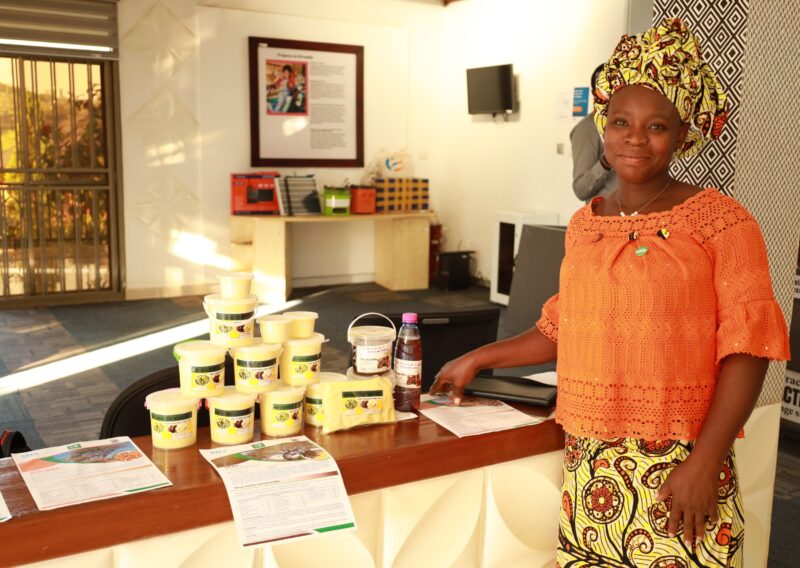Resilience meets opportunity for women’s farmers and foresters. In the face of daunting challenges, women like Awa Convollo are harnessing renewable energy to transform their lives, increase productivity, and uplift entire communities.
From sharing experiences in Rwanda to empowering women through training in productive energy use, this blog unveils a story of women pioneering change with the support of initiatives such as our Renewable Energies for Agricultural Livelihoods programme (REAL).
In Burkina Faso, women farmers and foresters face several challenges, including access to land, energy needs, a lack of suitable financing and a lack of knowledge of renewable energy technologies. Awa Convollo, a brave and active woman, is the president of a simplified cooperative society (SCOOP) that manufactures shea butter, and her fellow women in the cooperative face difficulties that limit their activities and prevent them from increasing their income and productivity.
“We’ve always worked manually, and that’s a real brake on the speed of our production, not to mention the labour involved for a woman. Not having had the chance to be trained in business management, it is hard for us to keep track of our incomes”, says Awa.

Burkina Faso is one of the countries in the world where inequality between women and men is the most serious. The main obstacle to gender equality could be traced to the weight that society and culture put on traditional roles, which prevents rural women from contributing to the development of themselves and their communities. According to Burkina Faso’s national poverty profile, 44.5% of Burkina Faso’s population live below the absolute poverty line, the majority of whom are women. Women are vulnerable in many areas of Burkina Faso, including access to education, land, financing, employment and quality health services. This situation is even more difficult for women in rural areas, where the overload of domestic chores reduces their time for production and income-generating activities (IGAs). In addition, limited access to renewable energy resources and modern production technologies hinders women farmers’ ability to increase their incomes.
This can be turned around. So, to support and empower the cooperative, represented by Awa, participated in a knowledge-sharing trip to Rwanda, to the Mahama refugee camp in the east of the country. The trip was made possible by the support of Practical Action and the Swedish Embassy in Burkina Faso as part of the Renewable Energy for Agricultural Livelihoods programme (REAL) programme, to share learnings and experiences on how women are facing and tackling the same challenges and how Practical Action in Rwanda has been supporting women to be self-sufficient through renewable energy.
Awa’s cooperative is seizing the opportunities presented by the REAL programme, which aims to uplift the well-being of women and young smallholders in agricultural and forestry value chains by increasing their incomes through renewable energy adoption. To reach as many women as possible, we are working with women’s groups to provide training in technologies for the productive use of energy (PUE), including solar pumping, improved stoves, solar hullers and more. Through this approach, we are sharing the numerous benefits these technologies offer, such as increased income, reduced workload, and alternatives to lower wood costs and eliminate fuel ones.
“It’s a great relief to know that access to renewable energy will not only make our lives easier, but also increase our productivity. Thanks to this trip, I’ve been able to meet women who work in processing like me, and I’ve learnt a lot from them. One of the things that has impressed me the most is having learnt that there are ways of managing your income and investing it. It was a real eye-opener, and I’m happy to be able to share it with women back in my country”, Awa added.
Our approach is to connect the dots in the energy-agriculture market to create more opportunities for farmers and thriving local economies. To this end, we are forging solid partnerships between suppliers of PUE technologies, financial institutions and everyone involved in the value chain, ensuring women’s active participation. This collaboration ensures that financial products are tailored to the needs of women farmers, PUE technology suppliers understand what’s really needed, and women farmers have a platform to voice their energy and financing needs. This market-focused strategy empowers women to take charge and achieve true autonomy in various aspects of their lives.
To provide women with the best possible opportunities, our work in this programme focuses on market gardening, non-timber forest products, rice, fish farming and poultry. Through tailored efforts in these agricultural and forestry sectors, we empower women by introducing and integrating PUE technologies. This approach not only enhances their capabilities but also fosters their overall empowerment.
For the societal changes that will drive women’s empowerment to be spaces of growth for communities as a whole, men have an important role to play. To this end, men are also actively engaged in activities aimed at understanding PUE technologies and supporting women’s organisations. Working closely with men as support in women’s groups allows a sustainable transfer of knowledge and power to women.
We aim to reach 10,000 women by 2025. By January 2023, 2,000 women have already been part of the training. During these training sessions, demonstrations were given on the use of improved stoves, solar lamps and biodigesters.
